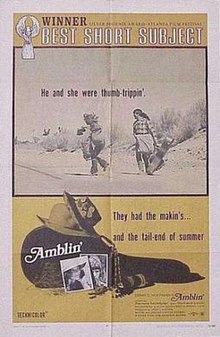Amblin'
| Amblin' | |
|---|---|

Poster
|
|
| Directed by | Steven Spielberg |
| Produced by | Denis C. Hoffman |
| Written by | Steven Spielberg |
| Starring | Richard Levin Pamela McMyler |
| Music by | Michael Lloyd |
| Cinematography | Allen Daviau |
| Edited by | Steven Spielberg (uncredited) |
| Distributed by | Sigma III Corp. |
|
Release date
|
|
|
Running time
|
26 minutes |
| Country | United States |
| Budget | $15,000 |
Amblin' is a short film made in 1968. It is the first completed film shot by Steven Spielberg on 35mm. The film is a short love story set during the hippie era of the late 1960s about a young couple making their way through the desert to the shore. In later years Spielberg named his successful company after his first movie — Amblin Entertainment.
A young man carrying a closely guarded guitar case befriends a free-spirited young woman while hitchhiking across the desert in southern California. En route to the Pacific coast. At the beach the man frolics in the surf while the woman covertly inspects the contents of his guitar case: a suit and tie, toothpaste, mouthwash, Milk of Magnesia, a roll of toilet paper and a copy of Arthur C. Clarke's The City and the Stars. The woman smiles in bemusement, perhaps sensing all along that her companion was not the quintessential hippie that he appeared to be. She then leaves the beach without him.
There is no spoken dialogue in the film aside from the lyrics to the opening and closing theme song. There is an ambient soundtrack featuring bird sounds, wind, passing car noises, popping noises made by the characters, fire sounds, and laughter, along with instrumental music.
Spielberg found his lead actor Richard Levin working as a librarian in the Beverly Hills library. For the mysterious redhead in the film, Spielberg discovered Pamela McMyler from the Academy Players directory. She had previously been a member of the Pasadena Playhouse and had a small role in The Boston Strangler.
Amblin' became a reality after Spielberg was introduced to aspiring producer Denis C. Hoffman. This movie, only 26 minutes long, led to his becoming the youngest director ever to be signed to a long-term deal with a major Hollywood studio (Universal) after Sid Sheinberg, then the vice-president of production for Universal Television saw the film. The movie had a $15,000 budget. In 1968, his friend Denis Hoffman provided financing of approximately $10,000 for the production of the film. At the time, Hoffman had no experience in producing, writing or developing projects for motion pictures. At Hoffman's request, the music of October Country, a band he was managing at the time was used for the film.
...
Wikipedia
